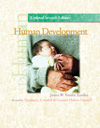 |  Human Development: Updated, 7/e James Vander Zanden,
Ohio State University
Thomas Crandell,
Broome Community College
Corinne Crandell,
Broome Community College
Early Childhood 2 to 6: Physical and Cognitive Development
Learning ObjectivesAfter completing Chapter 7, you should be able to:
1Describe physical growth and motor skill development in early childhood regarding:
rate of growth:
self-stabilizing quality:
impact of coordination:
|
 |  |  | 2Briefly explain aspects of sensory development of children from 2 to 7 years old. |
 |  |  | 3Discuss the role of nutrition in developing children. |
 |  |  | 4Describe the implications of changing demographics on children's health. |
 |  |  | 5Briefly explain the developing cognitive abilities of children from 2 to 7 years old.
intelligence:
intelligence as a general factor (Binet):
intelligence as a composite of abilities (Spearman):
the two-factor theory of intelligence:
Gardner's 7 intelligences (intellectual profile):
intelligence as a process:
intelligence as information processing:
|
 |  |  | 6Psychologists have conflicting views about the impact of heredity and environment on intelligence. Briefly describe the following positions:
heredity (nature) is significant:
major findings from studies of identical and fraternal twins:
nurture (environment) is significant:
contemporary scientific consensus:
Bouchard (1990):
Jencks' (1972) gene-environment covariance:
|
 |  |  | 7Define what Piaget meant by the preoperational period and characterize the thinking of the preoperational child by describing:
use of symbols:
conservation performance:
centering:
state vs. transformational reasoning:
nonreversibility:
egocentrism vs. sociocentrism:
|
 |  |  | 8Describe critiques of Piaget's work based on the following examples:
talking and communication:
altruistic (prosocial) behavior:
|
 |  |  | 9Discuss recent research on children's theory of mind. |
 |  |  | 10Discuss the conceptual foundations for learning in young children regarding:
causality:
number concepts:
|
 |  |  | 11List signs of atypical cognitive development. |
 |  |  | 12Describe the components of language acquisition.
phonology:
morphology:
syntax:
pragmatics:
|
 |  |  | 13Define Vygotsky's Zone of Proximal Development (ZPD). |
 |  |  | 14Explain the hypothesis of childhood amnesia. |
 |  |  | 15Define each of the five major systems of memory.
procedural:
working:
perceptual representation:
semantic:
episodic:
|
 |  |  | 16Describe the following information related concepts:
recall:
recognition:
facilitation of relearning:
sensory information storage:
short-term memory:
long-term memory:
|
 |  |  | 17Explain how memory occurs, and distinguish between:
metacognition:
metamemory:
|
 |  |  | 18Describe rehearsal and categorizing as memory strategies, and discuss the Rossi and Wittrock study. |
|



 2003 McGraw-Hill Higher Education
2003 McGraw-Hill Higher Education